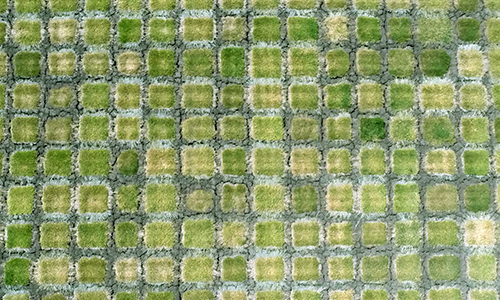Efforts to breed Zoysiagrass and St. Augustinegrass varieties for drought tolerance at the Texas A&M AgriLife Research and Extension Center at Dallas began in 2010 as part of the Specialty Crops Research Initiative — a program whose scope also encompasses work with bermudagrass and seashore paspalum turfgrass varieties. Participating researchers also focus on breeding for salinity tolerance and other important traits for the southern and south eastern regions of the United States.
The program is funded by USDA-NIFA and is a collaboration among Texas A&M AgriLife Research, North Carolina State University, University of Florida, Oklahoma State University and University of Georgia.
Turfgrass breeding-lines (different types of each species) are exchanged among partner universities as part of the initiative to undergo evaluation for water efficiency and drought tolerance under each partner’s respective climate conditions across the south and south east. Bermudagrass and seashore paspalum are bred by partner universities across the southern US and evaluated at the AgriLife Dallas Center while breeding efforts in Dallas focuses on Zoysiagrass and St. Augustinegrass varieties. The Dallas Center’s ability to breed Zoysiagrases in particular is bolstered by one of the world largest in-house zoysia collections of more than 800 unique types from across the globe.
Roughly 2,000 breeding lines have been exchanged among the partners over the life of the Initiative. About 140 have been identified as having strong potential for drought tolerance.
The second phase of the project, funded by USDA-NIFA in 2015, seeks to evaluate drought tolerant breeding lines for tolerance to salinity, shade, different mowing heights, pests and a variety of other factors. Breeding lines meeting the highest standards will be released for public consumption as varieties that contribute to sustainability through resource efficiency and tolerance to a range of environments.
Contact Dr. Ambika Chandra for information.
[email protected]

